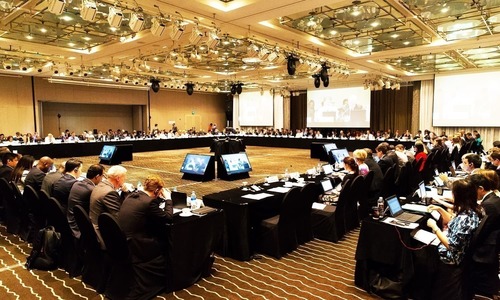It finally boiled down last week to just three areas of “demonstrating” outcomes that held back Pakistan’s exit from the list of increased monitoring — the so-called grey list of the Financial Action Task Force (FATF) — for another four months i.e. until the third week of June.
Reaching a compliance level of 24 targets out of the 27-point action plan is no mean achievement despite missing several deadlines. It entailed a whole lot of reorganisation of the legal, security, financial, trading, religious, regulatory and law enforcement structures that various entities had been resisting for ages and treating like virtual no-go areas under their respective domains.
Pushed by various global adversaries, Pakistan’s system against money laundering (ML) and terror financing (TF) was found wanting. The deficiencies were so “strategic” in the areas of financial sector, border control, legal standards, investigations and prosecutions that even friends stood neutralised when it came to international arm-twisting on political considerations.
Pakistan has to report back to FATF with full compliance on all 27 items after which the global watchdog will send a technical team for onsite verification
The June 2018 grey-listing of Pakistan by the Paris-based global watchdog on ML and TF came as a jolt and woke up the authorities living in silos. According to FATF, when it places a jurisdiction under increased monitoring, it means the country has committed to resolving swiftly the identified strategic deficiencies within agreed timeframes and is subject to increased monitoring.
Non-performance can lead to being described as high-risk jurisdiction, subject to a call for action, commonly called blacklist, with lethal consequences like international financial exclusion.
Pakistan made a top-level political commitment on a 27-point action plan. Roughly 10 items on the 27-point action plan pertain to the strengthening of the financial sector’s security, regulator protocols and border controls. Nine points belong to targeted financial sanctions against proscribed organisations and about eight cover robust investigation and prosecution mechanisms and systems. At least three dozen laws at the federal level had to be changed to meet the highest global standards along with upstream and downstream reporting networks.
That has to be done in a culture where every shop – small and big – has fundraising and collection points, where at least half the economy is informal, where cases remain undecided for generations, and where private armed mafias can operate with impunity and get protection at the highest level.
“To date, Pakistan has made progress across all action plan items and has now largely addressed 24 of the 27 action items. As all action plan deadlines have expired, FATF strongly urges Pakistan to swiftly complete its full action plan before June 2021,” the Paris-based financial watchdog said last week on the conclusion of its plenary and working group meetings.
The outstanding three action points include (i) demonstrating that TF investigations and prosecutions target persons and entities acting on behalf or at the direction of the designated persons or entities, (ii) demonstrating that TF prosecutions result in effective, proportionate and dissuasive sanctions, and (iii) demonstrating effective implementation of targeted financial sanctions against all designated terrorists, specifically those acting for or on their behalf.
FATF chief said Pakistan could not be considered for blacklisting even after the next deadline of June
This simply means that Pakistan is fully or largely compliant on all 10 areas of the financial sector and border control. Eight out of nine milestones under targeted financial sanctions are also completed while six out of eight on investigations and prosecutions are covered. The remaining three items include two targets on investigations and prosecutions and one in targeted financial sanctions.
This shows that FATF vocabulary has shifted from understanding, outreaching, developing system, audit, issuing suspicious reports, risk-based assessment and block etc. to “demonstrating” investigations, prosecutions and targeted sanctions.
Given some comments regarding political considerations, particularly diplomatic anxiety with France and the Daniel Pearl case with the United States, FATF President Dr Marcus Pleyer (of Germany) had to clarify FATF’s decisions remain rules-based as it looked at the reform framework, strength of the assessment and sustainability of the reform. He said Pakistan had made significant progress on all aspects of the anti–money laundering/combatting the financing of terrorism (AML/CFT) action plan “but severe deficiencies still remain relating” to terror financing.
The FATF president said he “strongly urged Pakistan” to complete the action plan at the earliest because only “a fully completed action plan including three outstanding areas” will be verified and then FATF members will test “its sustainability” and suggest future steps.
Responding to a question, the FATF chief made it clear that Pakistan could not be considered for blacklisting even after the next deadline of June because the country had agreed to complete the action plan, remained committed to it and shown progress on all counts. Hence, that was not the stage to put a country on blacklist. Yet, “we urge the government of Pakistan to make fast and very fast progress” to move forward.
Pakistan has now to report back with full compliance with all the 27 items after which FATF will send a technical team for onsite verification. The next plenary tentatively scheduled for June 20-25 will then decide if Pakistan had completed all the action points effectively and release it from the grey list.
The process also involved parallel Mutual Evaluation Report (MER) with the Asia-Pacific Group on Money Laundering, FATF’s regional affiliate that had in October last year retained Pakistan on its “Enhanced Follow-Up” list for meagre progress on FATF’s 40 technical recommendations on ML and TF. It had noted Pakistan improving full compliance on two out of 40 recommendations of FATF on the effectiveness of AML/CFT systems. Pakistan was noted non-compliant on four counts, partially compliant on 25 counts and largely compliant on nine recommendations.
Published in Dawn, The Business and Finance Weekly, , March 1st, 2021















































